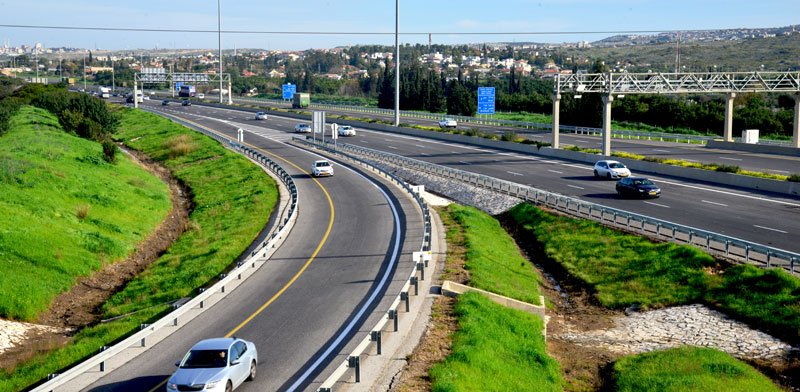Minister of Transport Miri Regev is promoting a plan to add an extra lane to Road 6 (Cross Israel Highway), which would be for ridesharing and public transport. The Ministry of Transport is considering building the extra lane through a tender with the new lane possibly being operated by a different franchisee to the current company operating the highway. The Ministry of Transport says that the project could resemble the fast lane on the Jerusalem - Tel Aviv highway (Road 1) between Ben Gurion airport and the Ayalon Highway (Road 20) at the entrance to Tel Aviv.
The widening of Road 6 to include a ridesharing lane is part of Regev's campaign to significantly reduce the cost of subscriptions on the Cross-Israel highway. However, the Ministry of Finance opposes the plan because it claims that it would increase demand for traveling on the highway, which is already heavily congested. Sources in the transport sector told "Globes" that talks on the matter between the Ministries of Transport and Finance, the government owned Cross Israel Highway company and the franchisee are currently deadlocked.
From a legal point of view, it is not possible to force the franchisee Derech Eretz Highways Management Corp. to cut its subscription fees because that would involve a change in the terms of the concession signed in 1999. Therefore, Regev is trying to reach an agreement on a new concession. The original 30 year concession does not expire until 2029.
Regev is offering a deal whereby toll charges would be cut by tens of percentage points and would be variable according to the time of day and in exchange the franchise would be extended by three years to 2032. In exchange, the franchisee would be permitted to add a fourth lane. The construction of a fourth lane from the Kessem Interchange near Rosh Ha'ayin northwards to the Iron Interchange would cost an estimated NIS 2.5 billion. Regev wants Derech Eretz to finance the project on the assumption that the increased traffic would more than repay the cost.
Regev claims that the tolls charged by Derech Eretz are among the highest in the world and that many of the drivers using the highway are captive customers because there are no practical transport alternatives for journeys. There will not be an alternative until ten years time when the eastern railway line is completed.
According to sources in the Ministry of Transport, "The minister want to promote alternative transport for young couples that are hard pressed to find affordable housing in the center of Israel and are forced to buy an apartment in outlying regions. The current price of subscriptions on the highway makes the accompanying costs of buying an apartment in outlying regions such that it is preferable to buy a more expensive apartment in the center of the country." The same sources add, "A ridesharing lane does away with the argument that cheaper tolls on the highway would lengthen the jams on it."
The Cross-Israel Highway was built by Derech Eretz Highways, which in 1998 won the tender to build and operate the 87 kilometer central section of Road 6. The State is entitled to 49% of the profits. Between 2010 and 2012, Derekh Eretz consortium members Africa-Israel, Shikun & Binui Holdings Ltd. (TASE: SKBN) and Canadian Highways sold their stakes to institutional funds Israel Infrastructure Fund (IIF) (75%) and the Noy Fund (25%). In 2012, Derech Eretz had a company valuation of NIS 2.66 billion.
The southern section of Road 6 from the Sorek Interchange is a regular free highway. The northern section of Road 6 from the Elyakim Interchange near Yokneam opened in 2018 is a separate franchise built and operated by Shapir Engineering and Industry Ltd. (TASE: SPEN).
Related News

